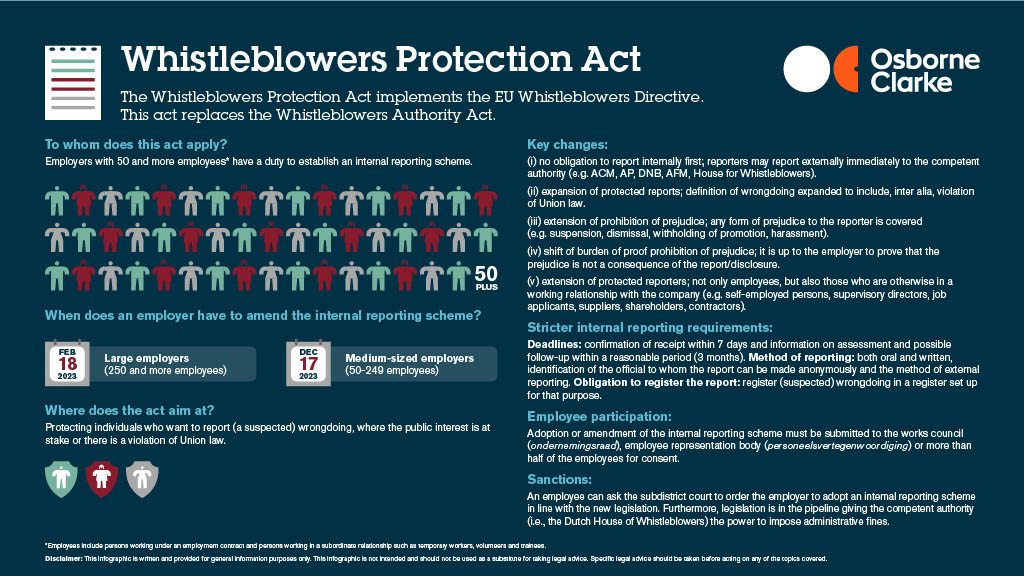Whistleblower protection extended in the Netherlands
Published on 6th February 2023
Employers with 50-plus employees are likely to have to amend their whistleblowers' policy

The Dutch Senate has passed (24 January 2023) the Whistleblowers Protection Act (Wet bescherming klokkenluiders), which replaces the Whistleblowers Authority Act (Wet Huis voor klokkenluiders). For many employers, this means that whistleblowing policy must be amended.
Better protection
Employers with at least 50 employees have been required since 1 July 2016 to have an internal procedure, a whistleblowers' scheme, for reporting suspected wrongdoings within the organisation. Reporters are protected from being harmed as a result of these reports. The Whistleblower Protection Act aims to better protect reporters and implements the EU Whistleblower Directive of 23 October 2019 (2019/1937).
Improvements implemented
The legislation expands the scope of protected persons. Besides employees, the law also protects persons performing work for remuneration in a relationship of subordination, such as self-employed workers, interns and volunteers. Importantly, this group must also be counted for the 50-employee threshold for the compulsory internal procedure. Moreover, the protection also applies to those who assist a reporter and third parties associated with the employer in a work-related context.
It extends the definition "wrongdoing" (misstand). This includes a (risk of) violation of Union law or an act or omission in which the public interest is at stake in (a risk of) violation of a statutory provision or internal rules of an employer.
There is also a strengthening of requirements on internal reporting procedures. Reports must be able to be made both in writing or orally (via telephone or other voice messaging systems or by conversation). Furthermore, it should be clear how to report suspected wrongdoing anonymously. The employer must also send the reporter an acknowledgement of receipt of the report within seven days and provide information on the assessment and follow-up within a reasonable period of no more than three months.
Reports must also be recorded by the employer in a register set up for that purpose and there is a specific ban on "silence clauses" that deprives the possibility of reporting wrongdoing. The reporter can also report internally through an intermediary. An anonymous reporter is obliged to make this report through a confidential intermediary, such as a lawyer. With the competent authorities, confidential reports can also be made externally by a lawyer or confidential advisor.
Direct external reporting has also been introduced. Reporters are no longer required to report internally first, but can report wrongdoing directly outside the organisation to a competent authority. And there is an extension of protective measures. A reporter must not be disadvantaged as a result of a report made in accordance with the act. The act includes a list of examples of what is meant by "disadvantage". Threats of and attempts to harm are also covered on the prohibition of disadvantage.
Right of consent and burden of proof
An employer who has not installed a works council or employee representative body and is not obliged to do so, needs the consent of the majority of employees when adopting the internal reporting procedure. This does not apply if the internal procedure is regulated by an applicable collective labour agreement.
The burden of proof has also shifted. As the adverse party, the employer must demonstrate that a reporting party's disadvantage is not the result of the report.
Enforcement and sanctions
The investigation department of the Whistleblowers Authority will have options for sanctions if an employer or organisation fails to comply with the act. Administrative sanctions can be imposed. Depending on the type of breach, a remedial sanction or punitive sanction may be imposed. In addition, any interested party can file an application for compliance with the act with the subdistrict court.
Entry into force
Employers in the private sector with at least 250 employees will have to comply with the act immediately upon its entry into force (at a date to be determined by Royal Decree). Private sector employers with 50 to 249 employees have until 17 December 2023 to comply with the internal procedure requirements.
Osborne Clarke comment
Employers with at least 50 employees or other persons who are in a subordinate relationship to the employer are likely to have to amend their whistleblowers' policy to comply with the Whistleblowers Protection Act.
Need help updating your whistleblowing policy? Do not hesitate to get in touch!





